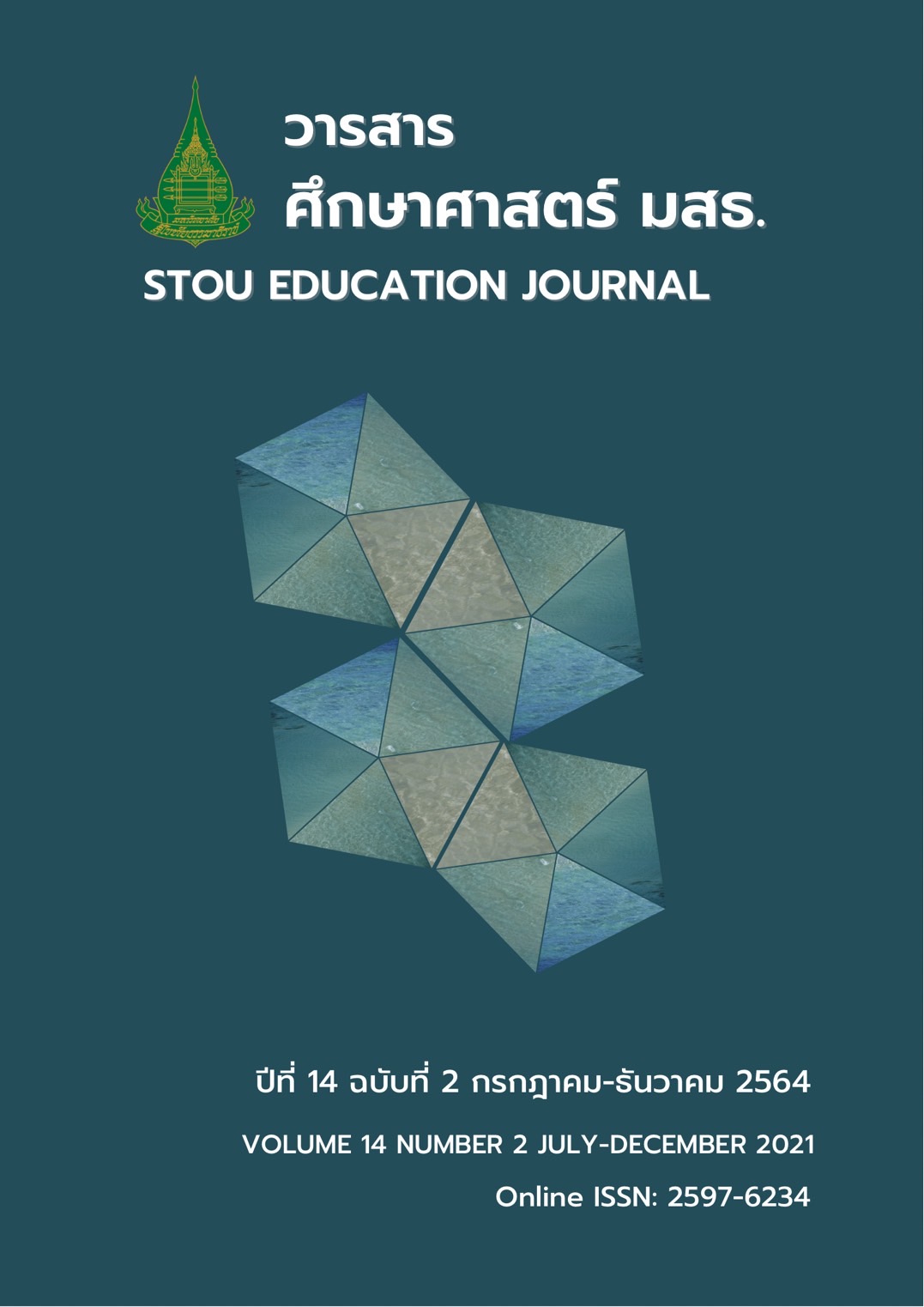รูปแบบการบริหารสถานศึกษาวิถีใหม่สู่คุณภาพการศึกษาที่พึงประสงค์ ในบริบทที่เปลี่ยนแปลง
Main Article Content
บทคัดย่อ
การวิจัยครั้งนี้มีวัตถุประสงค์เพื่อ 1) ศึกษากรอบแนวคิดการบริหารสถานศึกษาวิถีใหม่และคุณภาพการศึกษาที่พึงประสงค์ในบริบทที่เปลี่ยนแปลง 2) พัฒนารูปแบบการบริหารสถานศึกษาวิถีใหม่สู่คุณภาพการศึกษาที่พึงประสงค์ในบริบทที่เปลี่ยนแปลง 3) ทดลองใช้รูปแบบในสถานศึกษา และ 4) ตรวจสอบความสัมพันธ์เชิงโครงสร้างของรูปแบบกับข้อมูลเชิงประจักษ์ กลุ่มตัวอย่าง คือ ผู้บริหารโรงเรียนมัธยมศึกษา จำนวน 240 คนผลการวิจัย พบว่า 1) การบริหารสถานศึกษาวิถีใหม่ ประกอบด้วย 6 ด้าน คือ นโยบายเชิงรุก โครงสร้างองค์กรแบบยืดหยุ่น ระบบปฏิบัติงานแนวใหม่ พัฒนาหลักสูตรแบบพลิกผัน จัดการเรียนรู้อิงบริบท และประเมินผลแบบสหวิถี ส่วนคุณภาพการศึกษาที่พึงประสงค์ ประกอบด้วย 4 ด้าน คือ ความสามารถในการปรับตัว การบรรลุเป้าหมายในสถานการณ์พลิกผัน คุณภาพของผู้เรียนในบริบทที่เปลี่ยนแปลง ความพึงพอใจของหุ้นส่วน 2) รูปแบบที่พัฒนาเรียกว่า PSPCLE Model ประกอบด้วย 3 ส่วน คือ (1) มโนทัศน์การบริหารสถานศึกษาวิถีใหม่ 3 ด้าน (2) แนวทางการบริหารสถานศึกษาวิถีใหม่ 6 ด้าน และ (3) เงื่อนไขความสำเร็จการบริหารสถานศึกษาวิถีใหม่ 4 ด้าน 3) ผลการประเมินหลังการทดลองใช้รูปแบบ พบว่า PSPCLE Model มีความเหมาะสมอยู่ในระดับมากที่สุด ความเป็นไปได้อยู่ในระดับมาก และ 4) ผลการตรวจสอบความสัมพันธ์โครงสร้างเชิงเส้นของรูปแบบ พบว่า รูปแบบมีความสอดคล้องกลมกลืนกับข้อมูลเชิงประจักษ์ โดยมีค่า Chi-Square /df = 1.485, p-value = 0.07494 GFI = 0.98 RMSEA = 0.036 ข้อเสนอแนะจากผลการวิจัย คือ ผู้บริหารสถานศึกษาควรพลิกโฉมการบริหารสถานศึกษา วิถีใหม่ โดยจัดทำนโยบายเชิงรุก ปรับโครงสร้างองค์กรแบบยืดหยุ่น พัฒนาระบบปฏิบัติงานแนวใหม่ พัฒนาหลักสูตรแบบพลิกผัน จัดการเรียนรู้อิงบริษัท และประเมินผลแบบสหวิถี
Article Details
เอกสารอ้างอิง
พิมฉัตร ฤกษ์รัตน์ระพี. (2562). การพัฒนารูปแบบการฝึกอบรมสมรรถภาพการวิจัยของอาชีวศึกษาด้วยการเสริม พลังอำนาจแบบมีส่วนร่วม. วารสารวิชาการมหาวิทยาลัยอีสเทิร์นเอเซีย ฉบับสังคมศาสตร์และ มนุษยศาสตร์, 10(3), 172-186.
พฤทธิ์ ศิริบรรณพิทักษ์. (2562). การบริหารโรงเรียนของสหภาพยุโรป: Head of the School คือ School Director. ใน รวมบทความบริหารการศึกษากับการพัฒนาการจัดการเรียนรู้สู่การศึกษาในยุคดิจิทัล ชุดที่ 1 รวบรวมโดย จิณณวัตร ปะโคทัง. น. 123-132. อุบลราชธานี: วิทยาการพิมพ์ 1973.
ไพฑูรย์ สินลารัตน์. (2562). การศึกษาไทย: ถึงเวลาต้องคิดใหม่ คิดใหญ่ และทำหน้าที่ทันที. กรุงเทพมหานคร: มหาวิทยาลัยธุรกิจบัณฑิตย์.
ธีระ รุญเจริญ. (2562). ทิศทางการจัดการเรียนรู้สู่การศึกษา 4.0 ในยุคดิจิทัล. ใน รวมบทความการบริหารการศึกษากับการพัฒนาการจัดการเรียนรู้สู่การศึกษาในยุคดิจิทัล ชุดที่ 1. น. 5-9. อุบลราชธานี: วิทยาการพิมพ์ 1973.
วิจารณ์ พานิช. (2562). วิจัยชั้นเรียนเปลี่ยนครู: ฉันจะเป็นครูที่ดีขึ้นได้อย่างไร?. กรุงเทพมหานคร: มูลนิธิสยามกัมมาจล.
วิชัย วงศ์ใหญ่. (2563). New normal ทางการเรียนรู้ (electronic resource). กรุงเทพมหานคร: มหาวิทยาลัยศรีนครินทรวิโรฒ.
วิชัย วงษ์ใหญ่ และ มารุต พัฒผล. (2563). การประเมินการเรียนรู้ใน New normal. กรุงเทพมหานคร: บัณฑิตวิทยาลัยมหาวิทยาลัยศรีนทรวิโรฒ.
วิสุทธิ์ วิจิตรพัชราภรณ์. (2560) . บทบาทเชิงรุกของผู้นำการศึกษาไทย . ใน รวมบทความความเป็นผู้นำทางการศึกษา รวบรวมโดย ไพฑูรย์ สินลารัตน์ และนักรบ หมี้แสน. น. 112-120. กรุงเทพมหานคร: โรงพิมพ์แห่งจุฬาลงกรณ์มหาวิทยาลัย.
วิสุทธิ์ วิจิตรพัชราภรณ์. (2561). การนำนโยบายสู่การปฏิบัติ: แนวความคิด กระบวนการในองค์การทางการศึกษา. กรุงเทพมหานคร: บริษัท วิสต้า อินเตอร์ปริ้นท์ จำกัด.
สุกัญญา แช่มช้อย. (2564). การออกแบบนโยบายการพลิกโฉมระบบการเรียนรู้ที่ตอบสนองการเปลี่ยนแปลงของโลกในอนาคตในปี 2040. กรุงเทพมหานคร: อีเลฟเล่น สตาร์ อินเตอร์เทรด.
สุชัชวีร์ สุวรรณสวัสดิ์. (2562). การบรรยายพิเศษเรื่อง การเปลี่ยนผ่านกระบวนการทางความคิดสู่ D-Court 2020.
มีนาคม 2562 ณ ห้องสมุดศุนย์วิทยบริการศาลยุติธรรมเฉลิมพระเกียรติ.
สุพริศร์ สุวรรณิก. (2564). โลกจะเปลี่ยนไปอย่างไรหลังโควิด-19 จบลง?. สืบค้นจาก https://www.bot.or.th/Thai/ResearchAndPublications/aticle/Page/Areticle_30Mar2020.aspx
สำนักงานเลขาธิการสภาการศึกษา. (2560). แผนการศึกษาแห่งชาติ พ.ศ. 2560– 2579. กรุงเทพมหานคร: พริกหวานกราฟฟิค.
Bawany, (2018). Leading in a disruptive VUCA world. New York: Business Expert Press.
Brightside People Team. (2020). เทคนิคติดจรวดสร้างการเปลี่ยนแปลงวัฒนธรรมองค์กร. สืบค้นจาก https://www.brightsidepeople.com/ เทคนิคติดจรวดสร้างการ/
Hair, J. F., Black W. C., Babin B. J. and Anderson R. E. (2010). Multivariate data analysis. (7th ed). Upper Saddle River, New Jersey: Pearson Education, Inc.
Keeves, J.P. (1997). Models and model building. In Keeves, J.P. (ed.). Educational research, methodology and measurement: An International Handbook. (2nd ed). Oxford : Peraman Press.
Pacheco, J.A. (2020). The “new normal” in education. Research Centre on Education (CIEd), Institute of Education, University of Minho, Braga Campus de Gualtar, Portugal.
Pinar, W. F. (2019). Moving images of eternity: George Grant’s critique of time, teaching, and technology. Ottawa: The University of Ottawa Press.
Quilter-Pinner, H. and Ambrose, A. (2020). The new normal: The future of education after COVID-19.Institute for Public Policy Research. United Kingdom: London.
Shepherd, A.C. (2019). An analysis of factors which influence high school administrators’ readiness and confidence to provide digital instructional leadership. Retrieved from https://files.eric.ed.gov/ fulltext/EJ1218848.pdf


